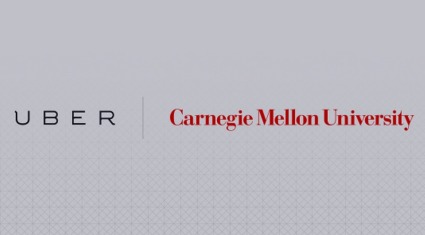
Robohub.org
Uber and Google are not breaking up quite yet

After yesterday’s story about Uber and CMU, and a rumour about Google’s plans to launch an Uber-like “ride share” service, a lot of speculation has flown that Uber will now be at odds with Google. Since then, the Uber blog post and this interview with Uber folks tell a slightly different story.
 Uber is funding a research center at CMU, and giving lots of grants to academics. Details are not fully available, but typically this means being at an early research stage. With these research labs, academics are keen to publish all they do, so little gets done in secret. In many cases the sponsor gets a licence to the technology, but it’s often not exclusive. If Uber wanted to build their own car, chances are they would do it in a more private lab.
Uber is funding a research center at CMU, and giving lots of grants to academics. Details are not fully available, but typically this means being at an early research stage. With these research labs, academics are keen to publish all they do, so little gets done in secret. In many cases the sponsor gets a licence to the technology, but it’s often not exclusive. If Uber wanted to build their own car, chances are they would do it in a more private lab.
Rumours that David Drummond would resign from the Uber board also have not panned out. Google has invested hugely in Uber (already for good return at the present valuation) and Google Maps offers you an Uber if you ask it for directions somewhere — it’s actually one of the easier interfaces for ordering one.
Rumours around Google’s efforts suggest that Big G has been testing a “ride share” app with employees and plans to launch it. Google has denied that, and says it loves Uber and Lyft. Further news revealed the rumours were about an internal carpooling system, not involving the self-driving cars. I could imagine confusion because Uber and others call themselves “ride sharing” — which is a bit of a fabrication to avoid looking like a taxi — while a carpooling app would constitute real ride sharing. (UberPool is real ride sharing.) Google, which has a terrible undersupply of parking on its campuses, is very keen on getting employees to ride its bus system and to carpool.
That said, Google has talked about the same thing I talk about — the true goal of robocar technology being the creation of a mobility-on-demand taxi service, like Uber but at a much lower cost. Google has not said that they would provide that themselves, or who they would partner with if they did it. Most people have presumed it might be Uber, but I don’t think that’s a given.
At the same time, Uber has assured its drivers that they are not going away for the foreseeable future. I suspect that’s an equivocation, and just means that we can’t see very far into the future right now!
A version of this post originally appeared on robocars.com.




